Guitar World Verdict
With its stylish, contemporary vibe, Fender Play is a joy to use for novices and early intermediate players. Refreshingly, its library of lessons and songs reach far beyond the somewhat hackneyed blues and rock classics favored by most of its competitors.
Pros
- +
Intuitive user experience with broad appeal
- +
In-depth lessons for novices and intermediates
- +
Step-by-step tuition keeps engagement high
- +
Professional production values, including multi-cam video
- +
Diverse song library to suit most tastes
Cons
- -
Little here for advanced players
- -
Some repetition in tuition content
You can trust Guitar World
Price: $19.99/£19.49 monthly, $149.99/£144.99 yearly
Free trial?: 7-days for monthly plan sign-ups, 14-days for annual plan sign-ups
Key features: Guided paths; bite-sized lessons; suitable for guitar bass and uke players; 700+ popular songs to learn; multi-angle camera
Sign up: Fender Play
For the purposes of this review, Fender Play granted us full access to their online lessons platform. We've just re-reviewed the platform to ensure that our opinions are up-to-date and based on the latest version of Fender Play.
Fender Play exists to help novices and early-intermediates stick at the challenging task of learning how to play the guitar, bass and, to a lesser extent, the ukelele. Why? It may appear mercenary, but Fender’s primary interest lies in selling as many instruments to you as possible over a lifetime of playing. That’s a tall order when its own research, conducted in 2019, confirms that 90 percent of beginners give up in the first year.
The upside is that Fender has sunk a lot of time, money and effort into making sure that Fender Play is an exemplary online guitar lessons platform, an investment we can all take advantage of, provided we’re happy to pay the membership fee.
For decades, Fender has had to tread a razor’s edge, selling traditional products – most dating back to the 1950s - to a contemporary audience. It’s a balance that it has excelled at, remaining a relevant, coveted brand to this day.
Fender Play successfully juggles past and present – it’s a beautifully designed product that’s respectful of Fender’s musical heritage while, at the same time, unafraid of forging new boundaries.
Free trial | Monthly plan | Annual plan |
Yes (7 days) | $19.99/£19.49 | $149.99/£144.99 |
Fender Play: Get 50% off an annual subscription
Sorted a free trial but now you want to continue getting all the benefits of Fender Play lessons beyond your trial? Fender is offering 50% off an annual plan for all Guitar World readers, dropping the price from $149.99 to just $74.99. Just add the code guitarworld50 at checkout.
Fender Play review: How does it work?
Fender Play is available as a web application that runs in any browser, or as an app for iPad, iPhone or Android. The user experience is very similar across all platforms, and Fender Play will save your progress, making it feasible to swap from one device to another between sessions.
On logging on, first-time users will be asked what instrument they would like to learn (acoustic guitar, electric guitar, bass guitar, ukulele) followed by the genre they want to specialize in. If selecting guitar, you will have a choice of six genres – rock, pop, blues, country, folk and R&B/soul. Once you make your selections, you immediately start on a learning path which, depending on instrument and genre, is made up of five to seven levels.
All the latest guitar news, interviews, lessons, reviews, deals and more, direct to your inbox!

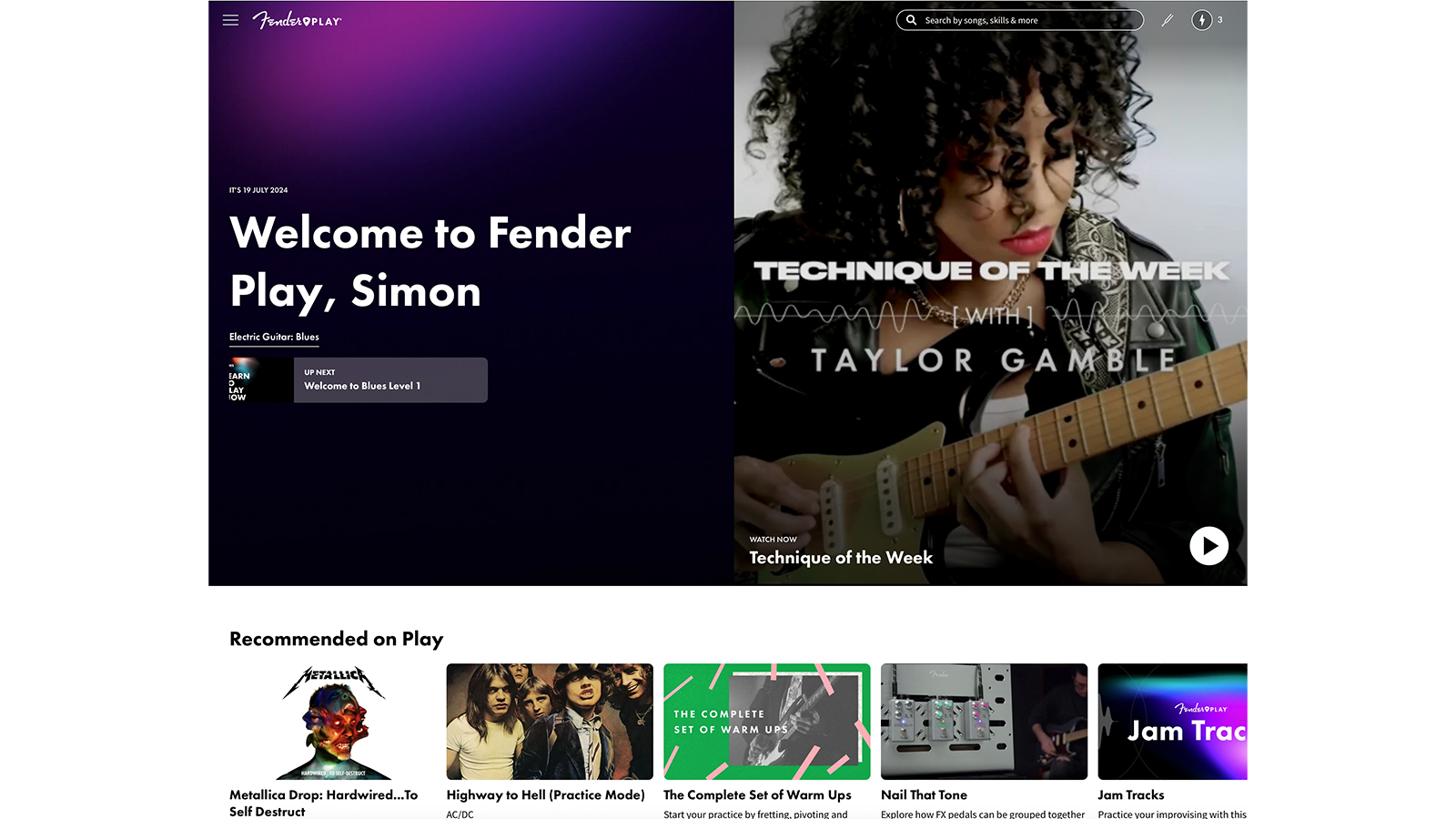
Every level contains numerous courses that are essentially deep dives into a skill, an element of practical music theory or a relevant song. Each course is made up of several activities – often bite-sized (3-5 min on average) video lessons and practice exercises.
Video lessons feature TAB, which is very helpful, but I would love to see Fender include standard notation too. There are also chord charts and tone guidance, including downloadable presets for Mustang GT/GTX amps. Video quality is excellent, and as you’d expect, multiple camera angles are commonplace so that you can see exactly what the picking hand and/or fretting hand is doing.
Practice Mode, as the name suggests, enables you to practice along to auto-scrolling TAB notation and a metronome. Playback can be slowed to 50% or 75%, until you’re up to speed with the song or exercise. Backing tracks, or more accurately instruments, are available in Practice Mode, making it fun and instructive to mix in drums, bass and guitar when practicing a song. Backing tracks are available for skills or riff exercises too, but they are limited to single instruments.
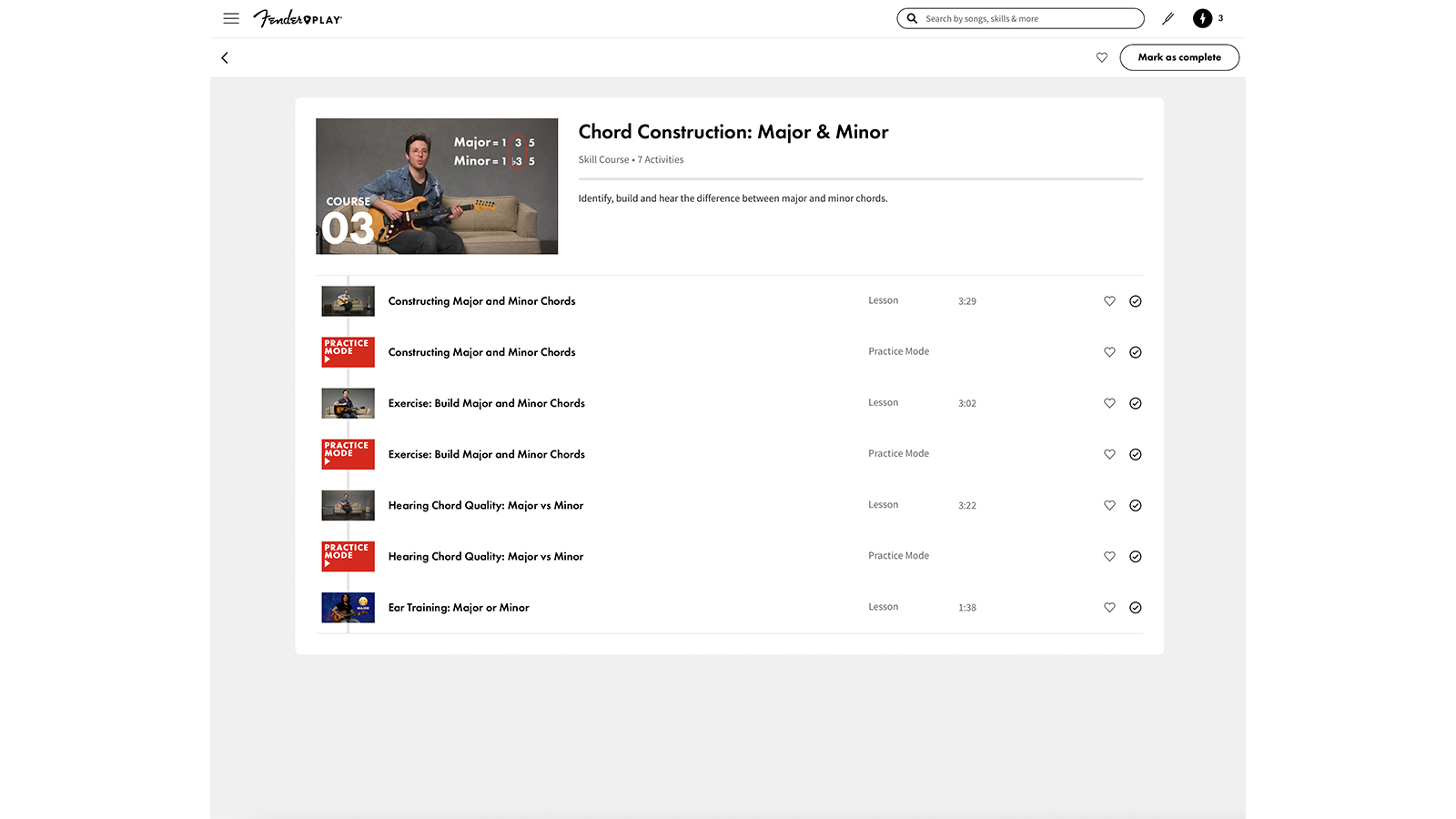
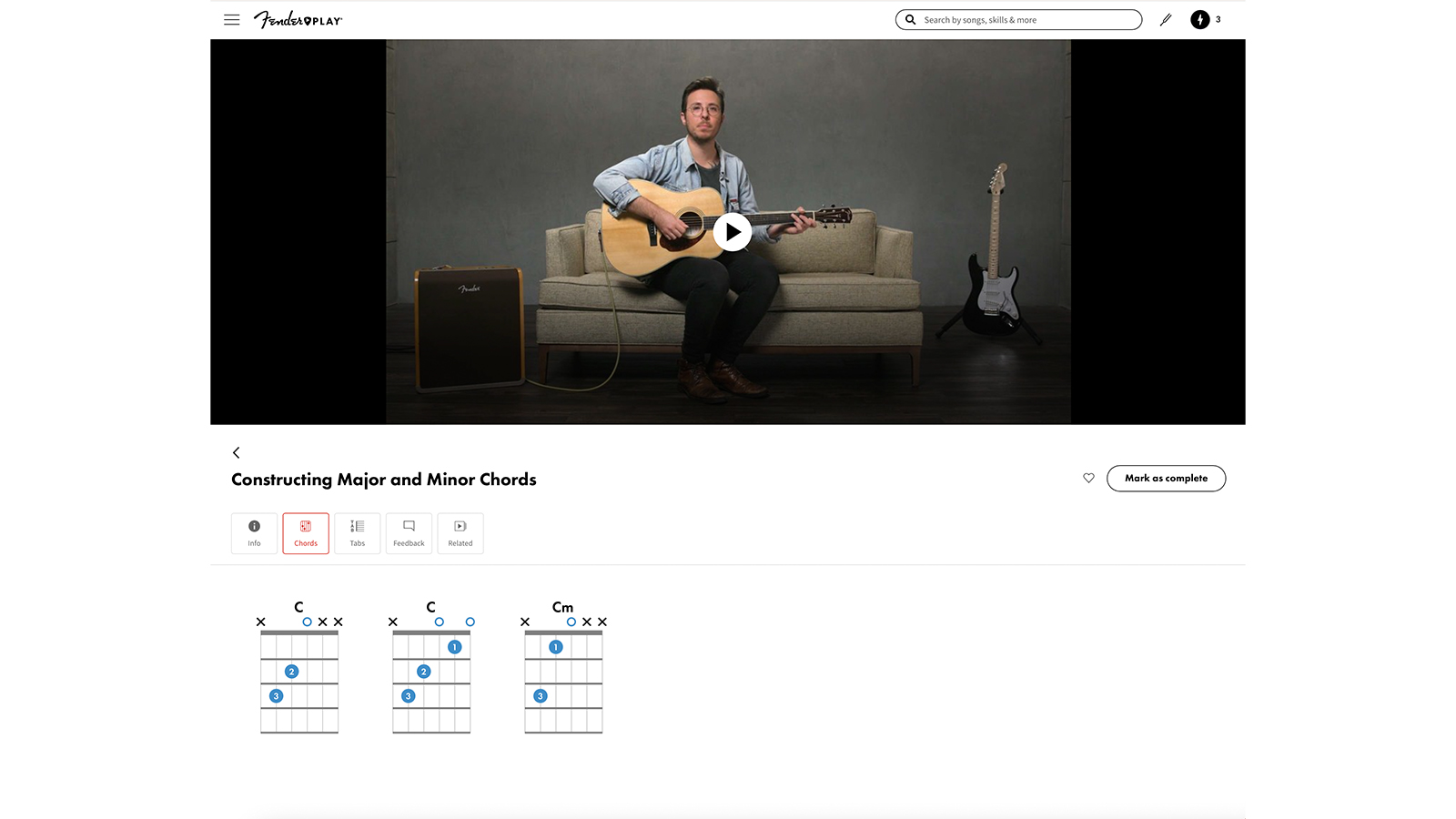
Relatively new to Fender Play is Feedback Mode, a feature still in Beta. If you’re using a smartphone or tablet, or your desktop computer has a microphone, you can record yourself playing an exercise and Fender Play will provide stats based on how successfully you completed the task. For example, it will give you a Length Played score, judged on how much of the exercise you completed; a Pitch Score, determined by how accurately you played the correct notes and chords; and a Rhythm Score that reveals your ability to play a consistent rhythm using the right timing. An overall score is also provided, based on an average of the three metrics.
Additionally, a Detailed Feedback overlay on the TAB highlights exactly where you played well, and where you suffered problems.
The breadth of Fender Play’s song library is a major strength, it’s peerless among its competitors. The number of songs runs into the hundreds – Fender doesn’t quote a precise figure because new songs are being added all the time – but it’s the variety of genres that impresses me most. That and the inclusion of so many modern songs.
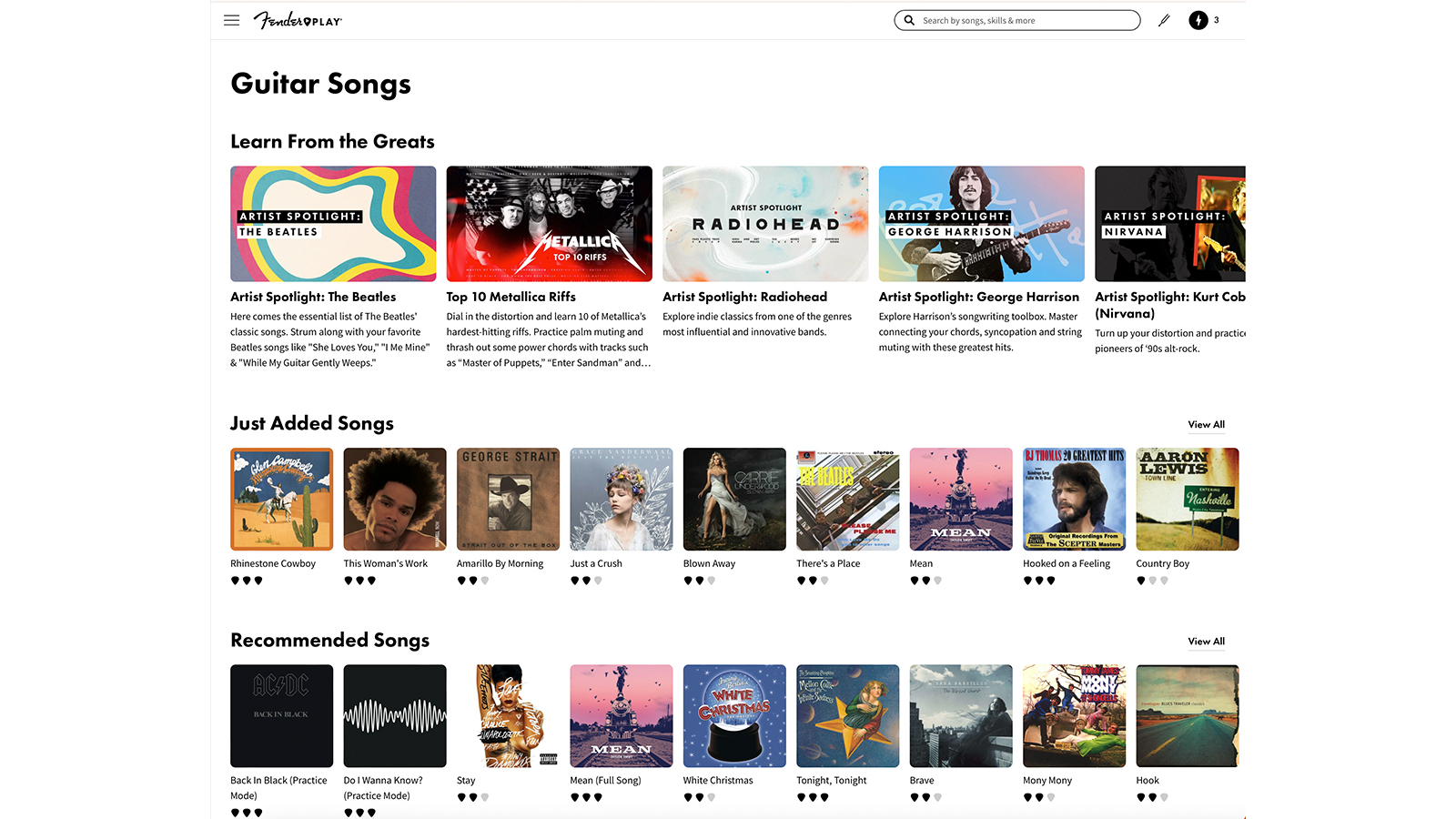
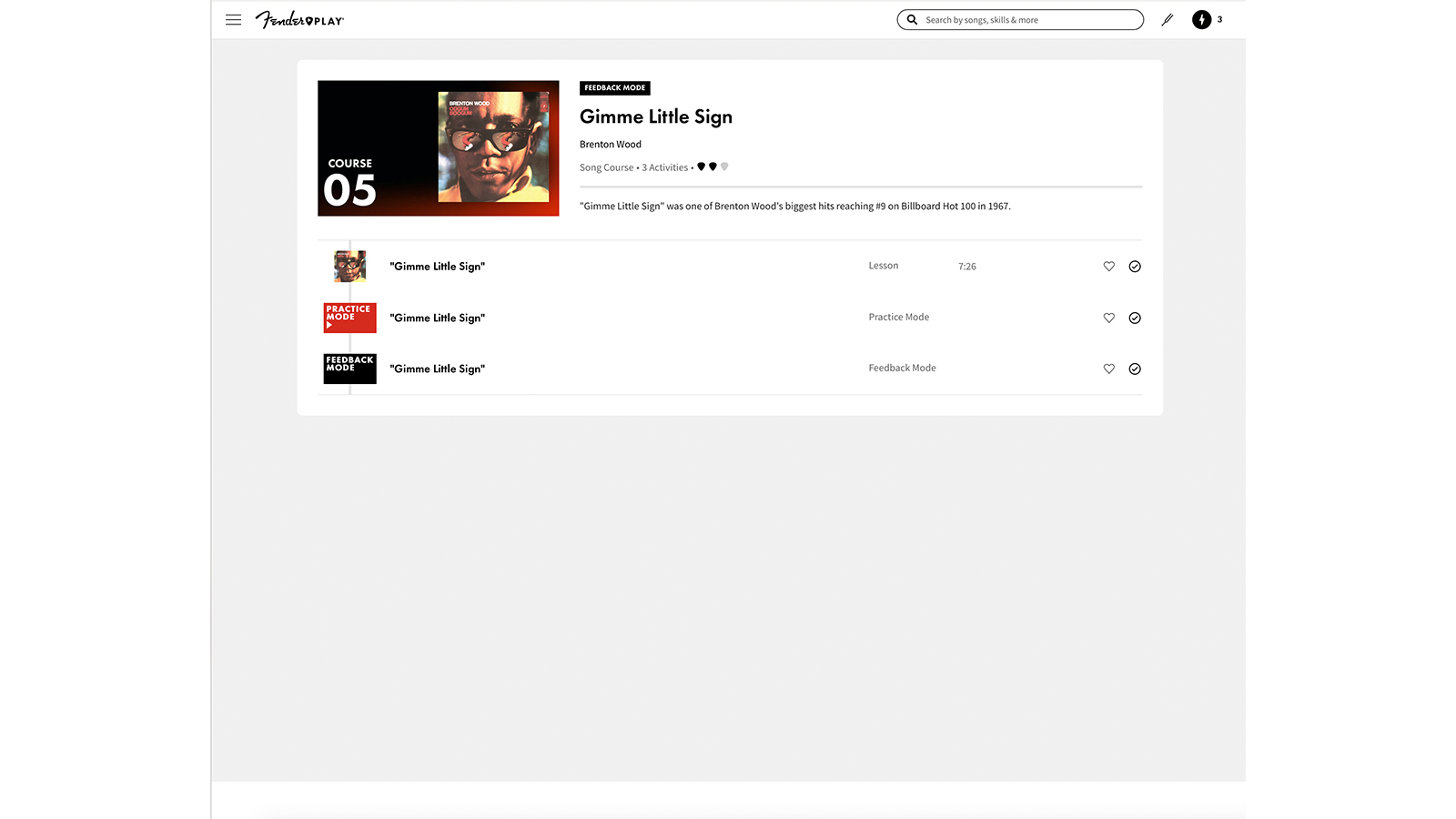
If you’re looking for rock and blues, you can find them here of course. However, players with more contemporary tastes will be thrilled to find the inclusion of artists such as Olivia Rodrigo, Fetty Wap, Taylor Swift and the ubiquitous Ed Sheeran.
Songs are ranked in difficulty from one to three, with plectrum icons used instead of the more usual stars. The library is fully searchable, and songs are also grouped by genre or theme within Collections.
If you want to fill in some gaps in your knowledge but would rather not work through an entire learning path, Fender Play’s Skills section has you covered. Here you’ll find a plethora of exercises to help you brush up on your Double Stop skills for example, or work on your string bend technique. Just be aware that these exercises are lifted directly from the learning paths, there’s no new content here as such.
Similarly, once you’ve successfully completed one path – let’s choose rock – but fancy learning country, you may find the first few levels repeat many of the basic skills, which gets repetitive. Fender would have been better looking to platforms such as Guitar Tricks, which require players to complete a foundation course before specializing in a genre.
Fender Play review: Who is it for?
Four or five years ago, Fender Play was a very capable tuition platform, but we could only recommend it to beginners. Since then, the program has moved forward apace, and we now consider it fit for both novices and early intermediates. The song library is continuously being expanded and, just as importantly, additional levels are being added to the learning paths. The latest update adds Level Six to the Bass Rock pathway, introducing skills such as two octave arpeggios and palm muting with a thumb pluck.
Fender Play will also appeal to beginners inspired by Swift and Sheeran as much, if not more, than they are Hendrix and Clapton. In this regard, Fender Play has something for everyone.
Fender Play review: Conclusion
Overall, as a tool to help people learn the fundamentals of an instrument, Fender Play does an exceptional job. The lessons are concise, comprehensive and fun, and the song library is expansive. While it may benefit some advanced players who want to cover off gaps in their knowledge, ultimately it targets beginners and early intermediates – areas in which it excels.
Fender Play review: Specs
- Price: $19.99/£19.49 monthly, $149.99/£144.99 yearly
- Free trial?: A 7-day free trial is available to new members when signing up for the monthly plan and a 14-day free trial is available to new members when signing up for the annual plan
- Key features: Guided paths; bite-sized lessons; suitable for guitar bass and uke players; 700+ popular songs to learn; multi-angle camera
- Genres: Rock, pop, blues, country, folk and R&B/soul
- Platforms: Desktop, iPhone, iPad, Android
- Contact: Fender Play
A look at the alternatives
Chris is a contributor to Guitar World and MusicRadar with around 20 years of guitar playing experience – including writing for and recording various projects for around 15 of those. Outside of practical experience, he’s studied music throughout his life, with a particular focus on composition at university. He’s something of a 90s tragic and a sucker for anything with a groovy, metallic edge or psych and stoner vibes. Outside of music, he’s an avid cook, gardener, and rugby league lover.



